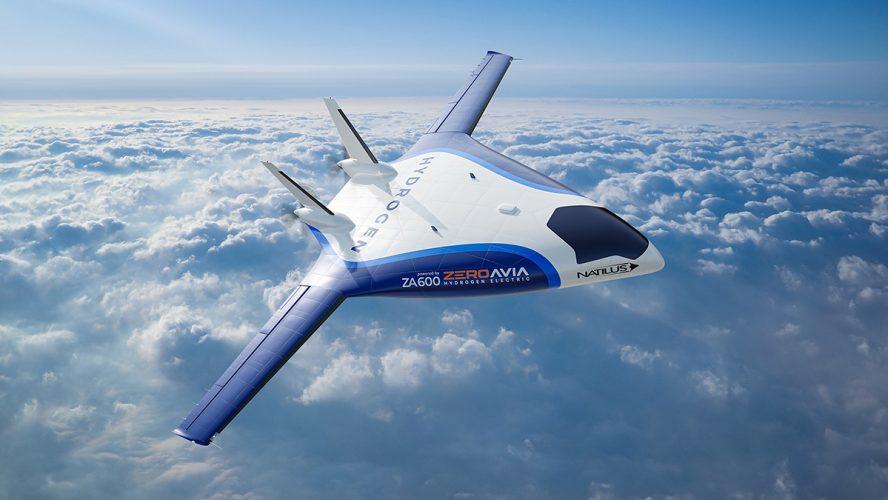
The Kona is designed to carry a 4.3-ton payload up to 900 nm at a cruising speed of 220 knots.
Natilus has selected ZeroAvia to supply its hydrogen-electric powertrain as an option for the autonomous, blended-wing-body (BWB) Kona aircraft.
As part of its new strategic partnership, announced May 25, U.S./UK-based ZeroAvia will offer its 600-kW ZA-600 fuel cell powertrain as an option for the Natilus Kona, an autonomous cargo feeder aircraft with a 900-nm range and 4.3-ton payload. The aircraft’s conventional version, currently under development by the San Diego-based startup, will be powered by two Pratt & Whitney Canada PT6A-67d turboprop engines.
Speaking to the AAM Report, Natilus CEO Alexey Matyushev said the Kona’s BWB configuration is a “natural fit” for hydrogen-electric propulsion, noting that the aircraft’s large, diamond-shaped cargo bay configuration holds 60% more storage volume compared to traditional tube-and-wing aircraft.
“The blended wing body just naturally lends itself to more volume, so it’s almost a hydrogen golden goose,” Matyushev says. “With traditional airplane configurations, you’re going to be sacrificing cabin volume or other areas within the airframe to introduce that hydrogen. But with Natilus, because we have room for days for extra storage space, we can get to the range that our customers want with no changes to the airplane.”
Matyushev acknowledges there are still “plenty of unknowns” surrounding hydrogen propulsion related to matters like pricing, production capacity and distribution. But he said ZeroAvia’s progress toward development and flight testing of its ZA600 propulsion system–expected to be certified in 2025–has been “really compelling, especially on the technological side.”
The modular design of the hydrogen fuel cell powertrain also aligns with the startup’s own vision of developing progressively larger BWB cargo aircraft in the coming years, including 60-ton payload and 100-ton payload variants.
Initial customer deliveries of the conventionally powered Kona aircraft are expected before the end of 2026, with the first ZA600-powered aircraft anticipated to arrive “within two or three years after that,” Matyushev says.
Nautilus has completed multiple wind tunnel tests of a 20%-subscale version of its Kona aircraft, validating its BWB design and gathering data that will be fed into the design of the full-scale prototype–with a wingspan of 85 ft. (26 m)–which Matyushev said he expects to roll out in early 2025.
The company’s current orderbook last stood at 460 preorders from major airlines and integrators including Ameriflight, Volatus Aerospace, Flexport, Astral, Aurora International, and Dymond.
